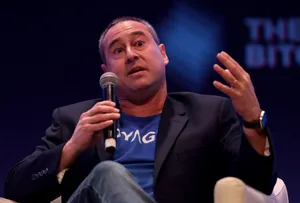Despite his promises, Pinillo had created no trading platform whatsoever, was doing no crypto trading, and simply pocketed all the money. Any payments made to his customers during the fraud were taken from newer investors, in classic Ponzi fashion.
Former pastor charged with crypto scheme in which he stole $5.9 million from his former congregants
- "CFTC Charges Washington State Pastor with Fraud, Misappropriation in Multilevel Marketing Scheme Targeting Hispanic Americans", US Commodity Futures Trading Commission [archive]
FTX settles complaint from the CFTC with $12.7 billion payout
Defendants Sam Bankman-Fried, Caroline Ellison, and Gary Wang, as well as the FTX and Alameda Research companies, will be prohibited from commodities trading, including trading bitcoin, ether, USDT, or other assets considered "digital asset commodities" by the CFTC. However, with Bankman-Fried already beginning a 25-year prison sentence, and Ellison and Wang due to be sentenced, this may be low on their list of worries.
- "Judge approves $12.7 billion settlement between FTX and CFTC, bringing 20-month-long lawsuit to an end", The Block [archive]
- Permanent injunction, document #44 in CFTC v. Bankman-Fried [archive]
CFTC subpoenas former company of Ben "BitBoy" Armstrong over crypto promotion
CFTC files complaint against Debiex platform for using "romance scam tactics" to steal $2.3 million
Debiex, however, only resembled a cryptocurrency trading platform. In reality, the website merely mimicked a trading platform, and the funds supposedly deposited there for trading purposes were taken by Debiex.
The CFTC identified five victims who were allegedly defrauded of a combined $2.3 million.
CFTC and FTC sue Voyager CEO Stephen Ehrlich
The FTC lawsuit focuses on Voyager's claims suggesting to customers that accounts with the lender were FDIC insured. That complaint also names Voyager as a defendant. Voyager settled with the FTC, agreeing to pay a $1.65 billion judgment that will be suspended until customers are repaid.
- "CFTC Charges Former Chief Executive Officer of Digital Asset Platform with Fraud in Massive Commodity Pool Scheme", CFTC press release [archive]
- "FTC Reaches Settlement with Crypto Company Voyager Digital; Charges Former Executive with Falsely Claiming Consumers' Deposits Were Insured by FDIC", FTC press release [archive]
- "CFTC and FTC sue former CEO of bankrupt crypto lender Voyager", BlockWorks [archive]
- "Voyager Ex-CEO Charged by U.S. Regulators With Fraud, Making False Claims", CoinDesk [archive]
CFTC goes after three defi projects
The CTFC stated: "Somewhere along the way, DeFi operators got the idea that unlawful transactions become lawful when facilitated by smart contracts. They do not."
SEC, CFTC, and FTC sue Celsius; CEO Alex Mashinsky arrested
Alongside the indictment from the DOJ, the Securities and Exchange Commission (SEC), Commodity Futures Trading Commission (CFTC), and Federal Trade Commission (FTC) each filed their own separate lawsuits against Mashinsky and Celsius.
These latest lawsuits join an existing lawsuit, filed in January 2023, against Mashinsky by the New York Attorney General.
Digitex Futures CEO to pay $15 million over commodities violations
According to Todd in a YouTube video, "We do not need to do KYC. [...] You should not have to give them because the U.S. government or whatever other [expletive] government in the world says that you need to. You do not need to. You just do not." Well, in that case.
Todd was also accused of trying to artificially inflate the price of the DGTX token by buying it on third-party exchanges, writing out his plans in excruciating detail with a customer who provided him funds to use on pumping the token.
CFTC awarded default judgment in case against Ooki DAO
Now, a judge has awarded default judgment in the case, requiring the DAO to pay a more than $640,000 penalty, close down its website, and stop trading.
The court held that the Ooki DAO was a "person" under the Commodity Exchange Act and thus could be held liable for violations of the law.
- Order on Motion for Default Judgment, Commodity Futures Trading Commission v. Ooki DAO
CFTC imposes record $3.4 billion fine on Bitcoin scammer
Steynberg has been ordered to pay a total of $3.4 billion — $1.7 billion in restitution and another $1.7 billion penalty. Steynberg was arrested in Brazil in December 2021 on an INTERPOL arrest warrant, where he has remained since pending extradition.
- "Federal Court Orders South African CEO to Pay Over $3.4 Billion for Forex Fraud", U.S. Commodity Futures Trading Commission







